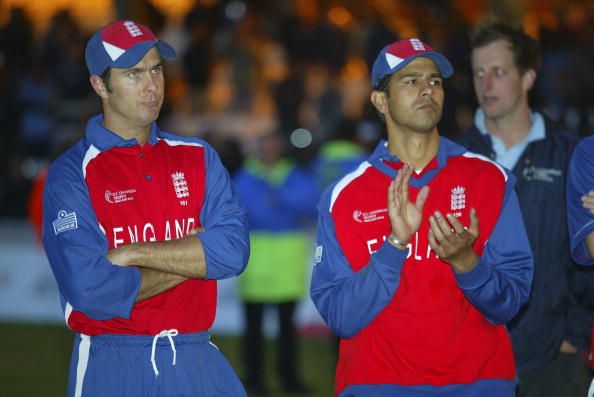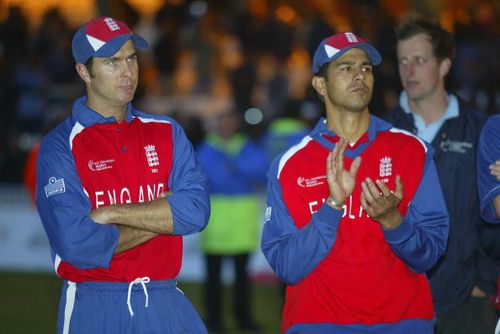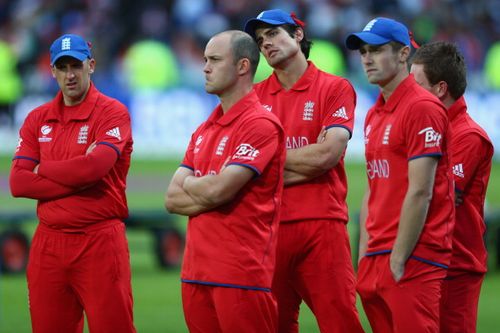
ICC Champions Trophy 2004 and 2013 – Different stories, but same ending for England
2004

After England’s elimination from the group stages in the 2003 World Cup under Nasser Hussain, the future looked bleak. It was England’s turn to host the ICC Champions Trophy next year and England fielded a bunch of young and inexperienced team comprising players like Andrew Strauss, Alex Wharf and Geraint Jones – trying to create a new beginning.
While they were unbeaten in the group stages, defeating Zimbabwe and a very strong Sri Lankan side, their run had nearly come to an end when they had to face the invincible Australians in the semi-final. But England managed to chase Australia’s 259 with ease, thanks to brilliant knocks from Marcus Trescothick , Captain Vaughan and Andrew Strauss.
England’s quest for their first ICC trophy nearly came to an end, with them having to face the West Indies side that were in their final stages of decline. England could only manage to set a target of 218 for the West Indies but early breakthroughs from Harmison and Flintoff put them on top. With West Indies at 147-8, needing another 71 runs, complacency hit England hard, with their bowlers unable to dismiss the tail-ender Ian Bradshaw and wicket-keeper Courtney Browne and West Indies ended up winning an international completion after several years.
2004 was a heart-breaking defeat for England where they just threw it away after being so close, but it marked a new beginning. It was a ray of hope and this beginning resulted in the team reaching great heights, including ending the long wait for The Ashes the very next year.
2013

In 2013, the circumstances were different, with England having a strong side, yet to prove themselves in ODIs, got into the Champions Trophy as host nation under Alastair Cook. However, England used the conditions well, got their tactics right and reached the final recording comprehensive wins, barring one defeat against Sri Lanka in the group stages.
While India were the favourites, so long as other things remained constant, they had a poor record at England – especially against the current generation of fast bowlers. However, on 24th June, 2013, nearly everything went against England except the toss.
First, it was the weather reducing the match to 20 overs per innings which gave India the obvious advantage as nearly all the players in the Indian team were also T20 players, whereas England doesn’t use their top three for a T20 match. Instead, the Cook, Bell and Trott trio stabilised the innings with Buttler, Bopara and Morgan providing the fireworks in the death overs. In fact, I felt a T20 solution to an ODI tournament was absurd and the tournament should’ve had reserve days like in 2002, especially with the weather forecast looking favourable in Birmingham the next day.
Despite the 20 over constraint, England bowlers restricted India to a meagre 129. But the batting had an unfortunate collapse, losing three wickets for just 40 runs and then came the Ian Bell decision. While a majority feel Ian Bell had got his foot in ground before the bails came off, third umpire Oxenford felt otherwise (what happened to benefit of doubt going in favour of the batsman?). This put considerable pressure on Bopara and Morgan, who, although aggressive batsmen by nature, had to stabilise the innings before they could go for the big shots. Had England a score like 75-3, the situation could have been entirely different. But England only have themselves to blame, requiring 20 off 16 and Bopara and Morgan threw their wickets, away leading to the eventual five run defeat.
While India deserved the win no less, following their domination in the tournament, it could’ve been much better if it had been in a 50 over game with umpiring decisions not being the talking point and I appreciate Alastair Cook’s courage to call Bell’s dismissal a poor decision.
So, 2004 and 2013 – England hosted the Champions Trophy and came so close to winning their first ODI tournament but snatched defeat from the jaws of victory. While 2004 could be fully attributed to the brilliant resistance from Ian Bradshaw and Courtney Browne, 2013 has a lot of other talking points. Purely from the perspective of an England supporter, 2004 was a heart-breaking defeat with no hard feelings, 2013 was a heart-breaking defeat with a LOT of hard feelings. The only solace for England could be winning the forthcoming Ashes, similar to what happened in 2004. The only positive for England from this tournament is that they’ve shown that they’re no pushovers when it comes to ODIs and I’d love to see them as a lethal force in the 2015 World Cup, and hope they win at least one long-deserving ODI trophy.